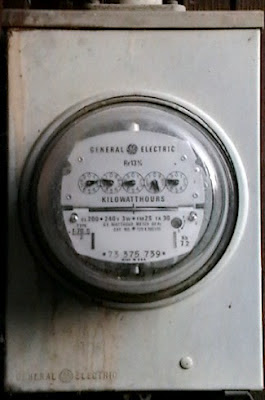Monday, June 11, 2012
Shocking!
In the optimistic 1950s, we were assured of a brighter future. We dreamed of all-electric houses as the epitomy of civilization.
Skip forward 60 years and the prospect of a mostly electric home is a nightmare for me.
Our Lick Skillet house, thankfully, has a propane furnace. But everything else is electric. The stove, the water heater, hook-up for the dryer. And the electric rate is half again as much as in New York!
We're taking our new, small refrigerator and will retire the old, large one that comes with the house. The pressure tank for the well is tiny so the pump runs more than it should; replacing that will be our first plumbing project. The dryer hook-up will remain unhooked for now, a clothesline will suit us fine. The central air conditioning needs work so we won't be running that for awhile and we have already started replacing all bulbs with cfls. We routinely turn off lights and unplug appliances, follow all of the standard energy saving advice.
But, please sir, I want some more.
More ideas for reducing those kilowatt hours. Some different perspectives could really help here. What are your best, easiest, fastest, most effective ways to use less power?
Subscribe to:
Post Comments (Atom)

What can be done, that you didn't mention (but maybe already do yourself):
ReplyDeleteHeat water with sunrays (there's lots of handmade heater projects you can make yourself), or with your furnace (in winter, you just need a copper pipe installed in the right place).
You can cook with sunrays, if you wish to go all out (using a round antenna layered with cooking metal sheets, you place the pot in the place where the receptor would be).
You can build a biodigestor and get some gas from it to cook (I know Gaia institute in Brazil doesn't purchase gas anymore, and they cook for hundreds of people in events), which can also be used to heat water.
I have some appliances I use a lot which are hand-powered, like a blender, a beater (?) to make egg whites puffy, a mixer, etc.
Also, a tiny solar pannel in the yard with a couple of batteries are enough to keep my laptop and cellphone charged without ever using the power grid. Depending on how much you use other appliances, you can also charge a battery-powerdrill, or anything else with a battery for that matter. My parents also use solar energy for a few key lights on the house, that tend to be more used at night (like bathroom or corridor lights).
Nowadays, there are even electricity counters that count backwards when you generate more power in your lot than what you're currently using, so you might even out your fee by the end of the month. In Brazil we don't have a way of getting paid if we by chance get a negative monthly count, but at least your bill could come zeroed.
Oh, yes. Using less water in general would mean a smaller use of your water pump = less electricity. Using rainwater for the garden also means less use for the pump.
On an additional note, the manual blender is really useful. Sometimes I have to resort to the electric beater (?), especially for cookie dough, but the blender is awesome. It saves a lot of energy and keeps your arms fit (like yours wouldn't already be from working the garden).
ReplyDeleteI don't have yet solar heating in my house, but it's on he plan for the mid-to-long term.
Talita, we are hoping to experiment with preheating water with a handmade solar rig but the price of copper pipe might delay that for awhile. I have a solar charger for my goat fence and can't help thinking that I should be able to use that to charge at least the cordless drill, I just don't understand enough to make the connection. Any larger solar operations are way out of our budget. At our NY house we average 6 kwh per day but with the additional electric stuff at our new house it will be hard keeping it that low but that doesn't mean we won't try!
ReplyDelete